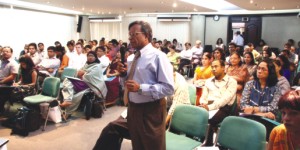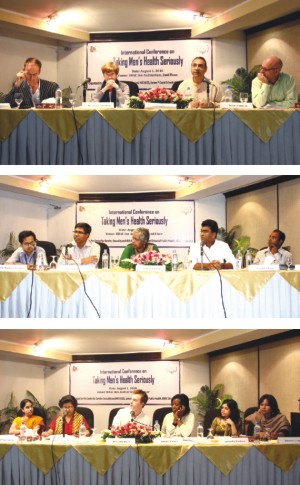Health
What Men Need
Anika Hossain
 |
A large number of participants from diverse fields share their perspective on men's health. |
Sexual and reproductive healthcare is more often than not associated with feminine concerns. Living in a patriarchal society, it may be surprising that an issue as important and healthcare can be neglected when it comes to men. We take it for granted that men's needs are so well catered for that our attention and resources are better put to use when advocating for the rights of women and children, the weaker members of the community. As a result, a critical aspect of healthcare, which not only affects men, but women as well in the long run, is being overlooked.
To bring this matter into perspective, an international conference on Taking Men's Health Seriously was organised by the Center for Gender, Sexuality and HIV/AIDS (CGSH), the James P Grant School of Public Health and BRAC University on August 1, 2010. This was funded by the UK Department for International Development (DFID).
The panel consisted of speakers from India, Pakistan, USA, UK, Africa and Bangladesh, who examined evidence from results of 5 years of research and advocacy work from the Realizing Rights on Sexual and Reproductive Health Research programme, which was funded by DFID. The partners of this project were BRAC University, Institute of Development Studies, UK, London School of Hygiene and Tropical Medicine, UK, African Population Health Research Centre, Kenya and In-depth Network, Ghana. Professor Hilary Standing from IDS, UK, coordinated the overall partnership.
The panelists considered policies and programmes, which would facilitate universal access to sexual and reproductive health services by the year 2015.
The central issues discussed involved the role of masculinity and seeking healthcare services. “The masculinity of hegemony is bad for our health,” says speaker Alan Greig. According to Greig, men do not seek healthcare easily because it is a feminised space, where there is a lack of specific services for men. Men's experience with violence, including child abuse is often kept silent. It is considered effeminate to lose control and need help and support of any kind. This unhealthy behavioral pattern and mentality affects not only men's health but also women's, in multiple ways (transfer of sexually transmitted infections etc). Therefore encouraging men to seek healthcare is also critical to improving women's sexual and reproductive health.
The panelists also addressed the issue of considering men as “all the same” when dealing with healthcare. They noted that this notion should be broken because there are different kinds of masculinity and socio economic background and class, sexuality, education all play an important role in men's attitude toward healthcare. Men from different walks of life will have different healthcare concerns and therefore it is important to address them separately. Poor, marginalised men are often talked about when healthcare concerns are addressed, while privileged men from the upper class are ignored.
 |
Speakers from India, Pakistan, USA, UK, Africa and Bangladesh
presenting research material on men's sexual and reproductive health. |
Research results show that men are worried about their SRH, and their concerns are not only biomedical, but psychosocial as well. Often, there are very few formal healthcare services that cater to men's needs and some men consider it more masculine to obtain help from informal sources such as Hakims (ayurvedic and homeopathic healers etc), which are often not appropriate or are of poor quality. These men spend a large part of their income in the informal sector, often obtaining little or no results.
In urban areas, the rapid changes in sexual and reproductive behavioral patterns are resulting in changes in sexual and gender norms (Same sex coupling). This leads to high risk for STI's and makes all genders vulnerable to poor SRH.
The panelists also talked about the link between men's SRH concerns and the high prevalence of domestic violence, especially in the lower classes of society, in particular the slum dwellers. According to research, if men's sexual needs were met adequately, and their SRH was properly addressed, they would feel less of a need to abuse their wives/partners physically and take their frustrations out on them. The proper care for STIs would also reduce the rate of transmission of STIs.
Inadequate healthcare services both medical and psychological, for men come with enormous costs to their spouses and their partners in the form of untreated STIs and high rates of domestic/intimate partner violence. Other costs include the stigma attached to being involved in homosexual relationships, which are still taboo in many societies.
The panelists concluded by saying that the importance of men's SRI needs are now being recognised on a global scale. Sexual and reproductive healthcare programmes are being designed to be more inclusive of men. This will serve to protect and empower women in the long run and will contribute to meeting the Millennium Development Goals on gender and health.
The huge number of participants from diverse fields ensured that the seminar gave a wide perspective on an issue that is often ignored yet has long-lasting consequences on society.130 representatives from different sectors of international organisations, legal institutions, developmental institutions, private and public universities, government officials, local and international NGOs, researchers, health care providers, academics, activists and journalists attended the event and contributed ideas for research, policies and programmes which will facilitate better sexual and reproductive healthcare provision for men in the future and encourage everyone to take men's health seriously.
Copyright
(R) thedailystar.net 2010
|

